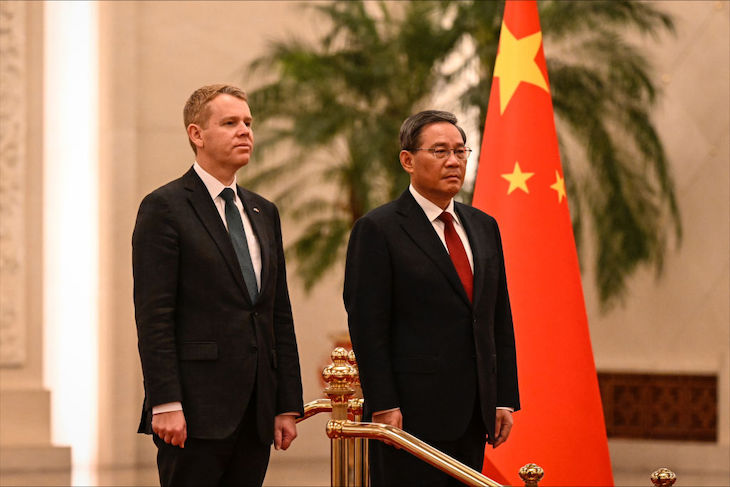Is New Zealand’s prime minister changing his tune on China? Chris Hipkins said this morning that China’s greater assertiveness has led to the Pacific region becoming ‘more contested, less predictable, and less secure.’ New Zealand is reliant upon China, a country that makes up about a third of its export market. So, when Hipkins, visited Beijing last month, it was hardly a surprise that he avoided saying anything to offend his hosts. But back at home, in a speech to the China Business Summit today, Hipkins felt able to be a little more forthright in his rhetoric; yet this largely served to emphasise a disparity between the language of direct interaction, and that of reflection on principles, in this tricky, ongoing diplomatic balancing act.
Hipkins reflected on ‘New Zealand’s evolving and multifaceted relationship with China.’ He said: ‘Our region is becoming more contested, less predictable, and less secure,’ noting that this poses challenges for small countries like New Zealand that are reliant on the stability and predictability of international rules for our prosperity and security.
The PM noted three key principles that will continue to guide New Zealand’s relationship with China: engagement and cooperation in areas where the two nation’s interests converge; that New Zealand will always act to preserve, protect, and promote its national interests and our values; and that New Zealand will work with partners to advocate for approaches that reflect its interests and values.
New Zealand also has a deep interest in a peaceful and stable Indo-Pacific region. As a trade-dependent nation, with nearly half its trade passing through the South China Sea, continued unimpeded access to shipping and air routes is vital. But this, Hipkins suggested, doesn’t mean that New Zealand isn’t willing to stand up to China. Hipkins made a point of mentioning that he had spoken robustly during his recent visit to China. But we’ll have to take his word for it: these discussions in Beijing were behind closed doors, and the New Zealand media were given next to no insights. Hipkins also refused to divulge what he discussed during his 40-minute chat with president Xi, or what was put forward by the Chinese side.
Following the meeting, Xi described New Zealand as a ‘friend and partner’. Asked whether he would characterise the relationship in the same way, Hipkins, after dissembling for a while, eventually framed the relationship as an ‘international partnership’ and a ‘friendship’, but it ‘depends on the context’. He said human rights were raised, although ‘not in great depth’.
New Zealand is striving to maintain a balance between China and its more traditional partners. Hipkins was among the world leaders who descended on the Lithuanian city of Vilnius for the Nato Leaders’ summit. Wellington is weighing up joining the second pillar of the Aukus agreement, made up of Australia, the UK and the US. The agreement is intended to offer a deterrent to Chinese military development and potential escalation in the Pacific. New Zealand’s participation in Pillar II of the agreement would involves the sharing of advanced military technologies and strategic information. But signing up to Aukus would mean alienating China – something Hipkins seemed hesitant about doing on his trip to Beijing.
New Zealand’s heavy trade reliance on China, and being at a slight remove from the likes of the US and Australia in terms of strategic planning and capacity, means New Zealand’s relationship with China will continue to be a tricky one.






Comments